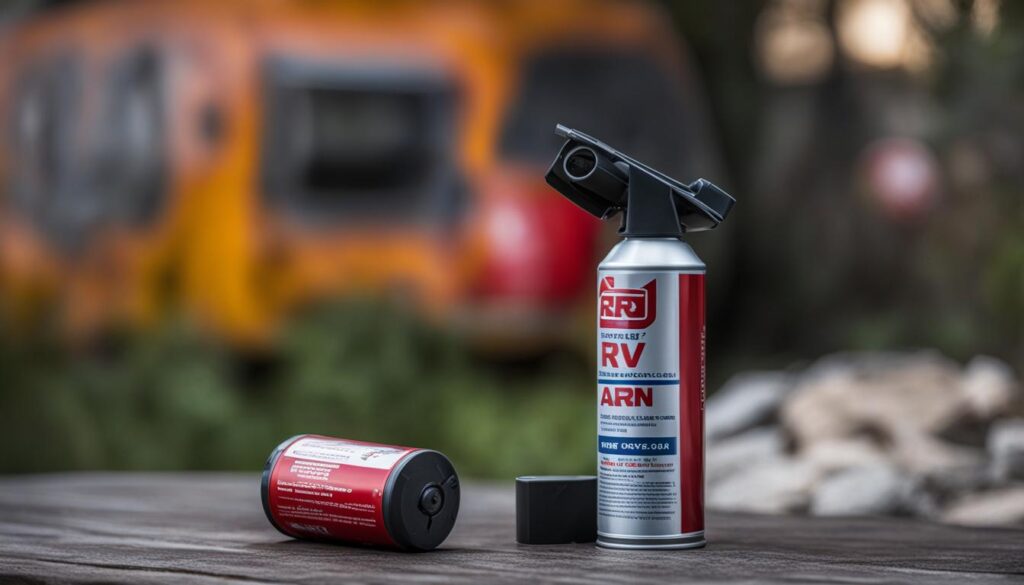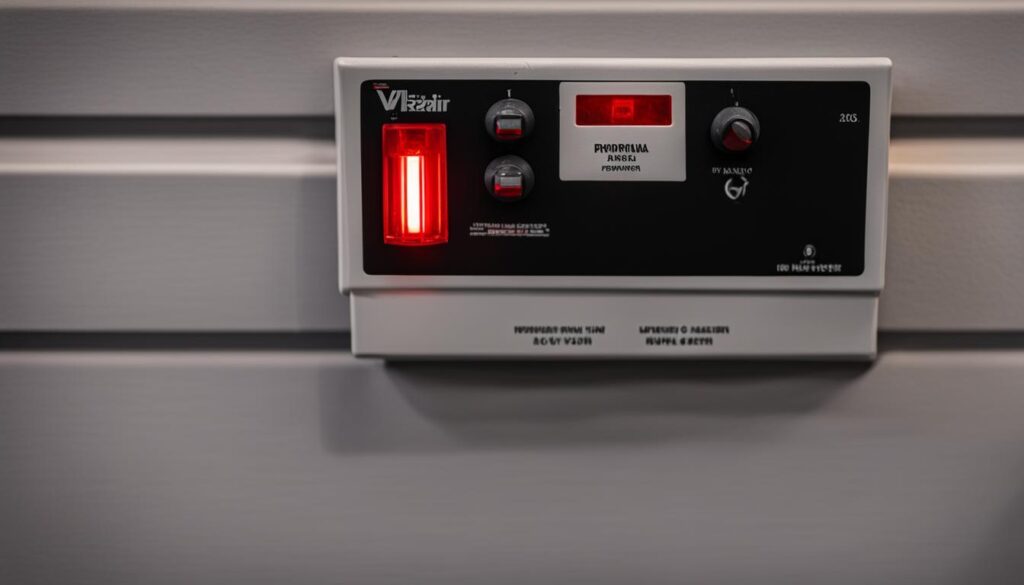Have you ever been woken up in the middle of the night by the incessant beeping of your RV propane alarm? It can be frustrating and alarming, leaving you wondering how to turn off the noise and find some peace. But fear not, there are solutions to this common problem. Whether you’re on a camping trip or parked at a campground, knowing how to disable your RV propane alarm can save you from a sleepless night.
Key Takeaways:
- Understanding the potential causes of a beeping RV propane alarm can help you troubleshoot the issue.
- Aerosols, obstructions blocking airflow, a dirty alarm, an out-of-date alarm, a low or dead RV battery, or a gas leak can all lead to a beeping alarm.
- Regular maintenance, cleaning, and checking the expiration date of your RV propane alarm are essential to ensure its proper functioning.
- Addressing any potential gas leaks promptly is crucial for your safety and peace of mind.
- By following the tips in this article, you’ll be equipped with the knowledge to stop your RV propane alarm from beeping and enjoy a peaceful night’s sleep during your RV adventures.
Contents
Why Does My RV Propane Alarm Keep Beeping?
Are you constantly bothered by the beeping of your RV propane alarm? If so, you’re not alone. There are several potential reasons why your RV propane alarm keeps beeping, and it’s important to understand and address the underlying cause to ensure your safety and peace of mind.
Here are some common reasons why your RV propane alarm may be beeping:
- Use of Aerosols Near the Alarm
- Obstructions Blocking Airflow
- Dirty Alarm
- Out-of-Date Alarm
- Low or Dead RV Battery
- Gas Leak
Let’s delve into each of these reasons in more detail:
Aerosols Near the Alarm
Aerosols, such as cooking spray, deodorant, bug spray, or antibacterial spray, can trigger your RV propane alarm. These products contain propellants like propane, butane, or isobutane, which can set off the alarm. Keep these aerosols away from the alarm to prevent false alerts.
Obstructions Blocking Airflow
An obstruction blocking the airflow to your RV propane alarm can also cause it to beep. This can happen if a pet, belongings, or other objects are obstructing the alarm’s vents. Clear the area around the alarm to ensure proper airflow.
Dirty Alarm
If your RV propane alarm hasn’t been cleaned regularly, dust and debris can accumulate on the detector. This buildup can trigger false alarms. Clean the alarm with a soft bristle vacuum or cloth to remove any dirt or grime.
Out-of-Date Alarm
RV propane alarms have a limited lifespan, typically around 5 to 7 years. If your alarm is outdated, it may start beeping to indicate that it needs replacing. Check the manufacturing date on your alarm and consider getting a new one if necessary to ensure optimal performance.
Low or Dead RV Battery
A low or dead RV battery can also cause your propane alarm to beep. The RV electrical system relies on a fully charged battery to power the alarm. Make sure your battery is properly charged to avoid this issue.
Gas Leak
The most critical reason for an RV propane alarm to keep beeping is the presence of a gas leak. Even a small gas leak can be dangerous, so it’s important to address the issue immediately. Fix the leak and test your propane alarm to ensure it’s functioning correctly.
Remember, your RV propane alarm is a crucial safety device that can potentially save your life. If you’re unsure about the cause of the beeping or if you suspect a gas leak, it’s always best to seek professional assistance to ensure your safety and the proper functioning of your RV propane system.
Reason 1: Aerosols
Aerosols can inadvertently set off an RV propane alarm, causing it to start beeping. Common household aerosols such as cooking spray, deodorant, bug spray, and antibacterial spray can trigger these alarms. This is due to the propellants present in these aerosols, which often include substances like propane, butane, or isobutane.
When you use aerosols near an RV propane alarm, the propellant particles can enter the alarm’s sensor and trigger a false alarm. The sensitive nature of RV propane alarms ensures they can detect even trace amounts of propane, leading to an activated alarm.
It is essential to exercise caution when using aerosols in the vicinity of an RV propane alarm. Placing the alarm away from areas where aerosols are commonly used, such as the kitchen or bathroom, can help minimize the chances of inadvertent activation. Additionally, ensuring proper ventilation in these areas can help dissipate any lingering aerosol particles that could trigger the alarm.
Tip: To prevent aerosols from triggering your RV propane alarm, always ensure proper airflow and ventilation in the vicinity of the alarm. Consider designating an area away from the alarm for aerosol use.
In case your RV propane alarm goes off due to aerosol usage, it is important to address the issue promptly. Open windows and doors to improve ventilation and air circulation, allowing any lingering aerosol particles to disperse. Resetting the alarm by temporarily disabling it or using the manufacturer’s recommended reset procedure can also help stop the beeping.
Remember, while aerosol usage can trigger an RV propane alarm, it is crucial to prioritize safety. RV propane alarms are designed to detect potential gas leaks, which can pose serious risks. If you suspect a gas leak or are unsure about the cause of the alarm, it is best to seek professional assistance to ensure your safety and the well-being of everyone in your RV.

| Aerosols | Potential Triggering Effect |
|---|---|
| Cooking Spray | Contains propellants that can set off the RV propane alarm |
| Deodorant | The propellant particles can enter the alarm’s sensor and trigger a false alarm |
| Bug spray | Common propellants found in bug sprays can activate the alarm |
| Antibacterial spray | Propellant ingredients in antibacterial sprays can lead to false alarms |
Reason 2: Obstruction Blocking Air Flow
An obstruction can significantly impact the proper functioning of your RV propane alarm. Whether it’s a curious pet, a bag of belongings, or a box inadvertently placed in front of the alarm, any obstruction can block the airflow and trigger the alarm to beep incessantly.
To prevent this issue, it is vital to keep the area around the alarm clear and free from any obstructions. Ensure that there is enough space for the alarm to detect propane gas accurately and alert you when necessary. Regularly inspect the alarm’s surroundings to identify and remove any potential obstructions that may impede the airflow.
“A clear and unobstructed path allows the RV propane alarm to function optimally, providing you with the peace of mind knowing that you’re protected from potential propane gas leaks.”
If you have pets onboard your RV, consider placing a barrier or gate around the alarm to prevent them from accidentally obstructing it. Additionally, make sure to store your belongings in a manner that does not interfere with the alarm’s airflow. By prioritizing a clutter-free environment around the alarm, you can reduce the chances of false alarms and ensure its efficient operation.
Remember, obstructing the airflow to your RV propane alarm not only hampers its performance but also poses a safety risk. Take necessary precautions to maintain a clear and obstruction-free area around the alarm to ensure reliable propane gas detection and, ultimately, your safety.
Reason 3: Dirty Alarm
A dirty RV propane alarm can be a common culprit behind the persistent beeping. Dust and debris can accumulate on the alarm’s detector, triggering false alarms. Regular cleaning of the alarm is essential to ensure its proper functioning and avoid unnecessary disturbances.
To clean your RV propane alarm:
- Turn off the alarm by disconnecting the power source or removing the batteries.
- Use a soft bristle vacuum attachment or a clean cloth to gently remove any dust or debris from the alarm’s surface.
- Ensure that the detector area is completely free from any obstructions.
- Once cleaned, reconnect the power source or insert fresh batteries and test the alarm to ensure it is working correctly.
Regular maintenance and cleaning of the RV propane alarm will help prevent false alarms and keep your RV propane system operating smoothly.
| Step | Instructions |
|---|---|
| 1 | Turn off the alarm by disconnecting the power source or removing the batteries. |
| 2 | Use a soft bristle vacuum attachment or a clean cloth to gently remove any dust or debris from the alarm’s surface. |
| 3 | Ensure that the detector area is completely free from any obstructions. |
| 4 | Once cleaned, reconnect the power source or insert fresh batteries and test the alarm to ensure it is working correctly. |
Reason 4: Out of Date Alarm
RV propane alarms are essential for ensuring the safety of you and your loved ones while traveling. However, these alarms have a limited lifespan of around 5 to 7 years. If you have an out-of-date alarm, it can start beeping to signal that it needs to be replaced. It is crucial to regularly check the manufacturing date on your propane alarm and take appropriate action when necessary.
Replacing an outdated RV propane alarm is a simple yet vital step in maintaining a safe and functional propane system in your RV. By having an up-to-date alarm, you can have peace of mind knowing that it is operating efficiently and accurately detecting any potential gas leaks.
If your RV propane alarm is outdated and needs replacing, consider the following steps:
- Research and choose a reliable and high-quality replacement alarm suitable for your RV propane system.
- Follow the manufacturer’s instructions for installation and make sure to adhere to any specific requirements or recommendations.
- Dispose of the old alarm responsibly, following local regulations for electronic waste or hazardous materials disposal.
- Test the new alarm to ensure proper functionality and perform regular maintenance checks.
An out-of-date RV propane alarm can compromise the safety of your RV and its occupants. Replacing the alarm promptly is crucial to prevent potential gas leaks and ensure a secure and worry-free travel experience.
Comparison of Out-of-Date and Updated RV Propane Alarms
| Features | Out-of-Date Alarm | Updated Alarm |
|---|---|---|
| Accurate Gas Leak Detection | May be less reliable | Provides accurate and timely detection |
| Lifespan | Approaching or exceeded recommended lifespan | Fresh and within the manufacturer’s specified lifespan |
| Technological Advancements | Lacks the latest advancements in propane detection | Utilizes advanced features for enhanced safety |
| Compatibility | May not be compatible with newer RV propane systems | Designed to work seamlessly with modern propane systems |
By replacing your out-of-date RV propane alarm, you are taking a proactive step towards maintaining a safe and reliable propane system in your RV. Remember to follow the manufacturer’s instructions and perform regular checks to ensure the continued effectiveness of your new alarm.
Reason 5: Low or Dead RV Battery
Reason 5: Low or Dead RV Battery
One of the possible reasons why an RV propane alarm keeps beeping is a low or dead RV battery. The RV electrical system is crucial for the proper functioning of the propane alarm, as it relies on battery power. If the battery is not adequately charged, it may not provide enough power to the alarm, causing it to emit a beeping sound.
To prevent this issue, it is essential to regularly check and maintain the RV battery. Ensure that the battery is fully charged and in good condition. Consider investing in a battery monitoring system to monitor the battery’s voltage and prevent it from reaching critically low levels.
Additionally, it is advisable to have a spare battery or a backup power source available when camping to avoid running out of power and experiencing a beeping propane alarm due to a low battery.

Table: RV Propane Alarm Troubleshooting Guide
| Reason | Possible Cause | Solution |
|---|---|---|
| Reason 1: Aerosols | Aerosol sprays triggering the alarm | Minimize the use of aerosols near the alarm |
| Reason 2: Obstruction Blocking Air Flow | Blockage by pet, belongings, or objects | Ensure the area around the alarm is clear |
| Reason 3: Dirty Alarm | Accumulation of dust and debris | Clean the alarm regularly with a soft bristle vacuum or cloth |
| Reason 4: Out of Date Alarm | An alarm past its recommended lifespan | Replace the alarm with a new one |
| Reason 5: Low or Dead RV Battery | Inadequately charged RV battery | Ensure the battery is fully charged and in good condition |
| Reason 6: A Gas Leak | Potential gas leak | Fix the gas leak and test the alarm for proper functioning |
Reason 6: A Gas Leak
The most critical reason for an RV propane alarm to keep beeping is the presence of a gas leak. Gas leaks can be extremely dangerous and pose a significant safety hazard, as even a small amount of gas can lead to fire or explosion. It is crucial to address the issue immediately to ensure the well-being of yourself, your loved ones, and the RV.
When you suspect a gas leak, the first step is to turn off all gas appliances and the main propane supply valve. Next, ventilate the RV by opening windows and doors to let the gas dissipate. In some cases, you may need to evacuate the RV if the gas smell is strong or persistent.
Once you have eliminated the gas leak and ensured a safe environment, it is essential to test your RV propane alarm to make sure it is functioning properly. This can be done by following the manufacturer’s instructions for testing the alarm. Regularly testing your propane alarm is crucial for early detection of gas leaks and ensuring your safety while on the road.
FAQ
How do I turn off my RV propane alarm?
To turn off your RV propane alarm, locate the alarm unit and find the reset button. Press and hold the reset button until the alarm stops beeping. If the alarm continues to beep after resetting, check for potential causes such as aerosols, obstructions, a dirty alarm, an out-of-date alarm, a low or dead RV battery, or a gas leak.
Why does my RV propane alarm keep beeping?
There are several potential reasons why an RV propane alarm keeps beeping. These can include the use of aerosols near the alarm, obstructions blocking airflow, a dirty alarm, an out-of-date alarm, a low or dead RV battery, or a gas leak.
Can aerosols trigger an RV propane alarm?
Yes, aerosols such as cooking spray, deodorant, bug spray, and antibacterial spray can trigger an RV propane alarm. These aerosols contain propellants like propane, butane, or isobutane, which can set off the alarm.
What can cause an obstruction that blocks the airflow to the RV propane alarm?
Obstructions such as pets, bags of belongings, or boxes can block the airflow to the RV propane alarm and cause it to beep. It is important to keep the area around the alarm clear and free from obstructions.
How can I clean a dirty RV propane alarm?
To clean a dirty RV propane alarm, use a soft bristle vacuum or cloth to remove the dust and debris from the detector. Regular cleaning can prevent the alarm from beeping due to a dirty sensor.
How often should I replace my RV propane alarm?
RV propane alarms have a lifespan of around 5 to 7 years. It is recommended to replace the alarm when it reaches its expiration date or if it starts beeping continuously even after resetting.
Can a low or dead RV battery cause the propane alarm to beep?
Yes, a low or dead RV battery can cause the propane alarm to beep. It is essential to ensure that the RV battery is adequately charged to prevent this issue. Check the battery voltage and charge it if necessary.
How serious is a gas leak in an RV?
A gas leak in an RV can be a severe safety hazard. Even a small amount of gas can be dangerous and potentially lead to an explosion or fire. If you suspect a gas leak, it is crucial to address the issue immediately and contact a professional for assistance. After fixing the leak, test the propane alarm to ensure it is functioning correctly.






